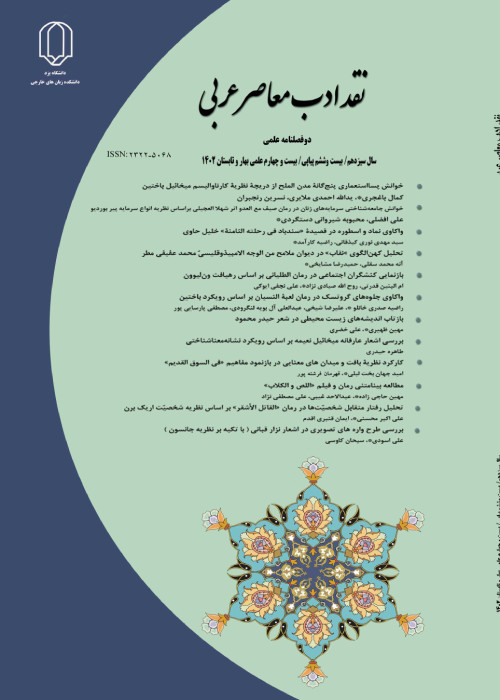Inspiration of the ancient myth of Gilgamesh in the contemporary Arabic poetry based on the poetry of Samih Al-Qasim, Adonis and Saadi Yousef
Author(s):
Article Type:
Research/Original Article (دارای رتبه معتبر)
Abstract:
Introduction
Myth has a special value and place in the contemporary Arabic poetry and is strongly intertwined with it. Prominent contemporary Arab poets turned to this element in order to symbolize the poetic language and to express ideas indirectly and more artistically. A very important myth that has appeared in a large bulk of contemporary Arabic poetry is the myth of Gilgamesh. This mythical character is defeated due to the inclusion of various meanings, including the attempt to discover the mystery of immortality, the desire for immortality, enmity and friendship together, enduring difficulties in achieving goals, meeting a wise old man, and trying to destroy evil. In the test of awakening, the loss of the plant of youth and the water of life, the surrender to destiny, etc., have created a good opportunity for contemporary Arab poets to present their personal and social experiences to the audience in the light of calling that myth in the context of their poetry. Samih al-Qasim from Palestine in the poem "Jaljamesh, Alloh-Al-Thales Ashar", Adonis from Syria in the two poems "Jalqamesh" and "Sajil 1999", as well as Saadi Yusuf from Iraq in the poem "Manzel al-Masrat" are among the poets who used this myth artistically.Methodology
This research has been done by a descriptive-analytical method, and content criticism has been performed through the analysis of the three poems.Results and Discussion
One of the most important mythological characters mentioned in the poetry of Samih Al-Qasim (1939-2014), a famous contemporary Palestinian poet, is "Gilgamesh". The myth has entered the poem book My exterior is the face of the essence of the day published in 2000 for the first time. In this poem, Samih Al-Qasim is inspired by the myth of Gilgamesh. What is striking at the outset is that the poet "unfamiliarizes" himself with this name. Because a tablet is added to the twelve tablets of the myth, the beginning of the speech is attractive to the audience and creates enthusiasm and motivation for reading the poem to the end and learning from the new words of the mythical character. It is worth mentioning that the poet based the poem on the centrality of Gilgamesh's character.In the relatively long poem Sejil (1999), Adonis has paid attention to this myth many times and tried to use the "formula of speech" and the technique of masking and identifying with the myth of Gilgamesh, as an intangible and objective equivalent, from the theme of that ancient text. In "Sajil", the poet has tried to use the same myth to portray the oppression and isolation of intellectuals. He wishes Gilgamesh had power and all the people of the city would obey him. But Gilgamesh is an unruly ruler and no one pays attention to his words. Therefore, the poet's purpose is to highlight the isolation of intellectualsThe contemporary Iraqi poet Saadi Yusuf has paid special attention to the myth of Gilgamesh in his poem "Manzel al-Masrat" from the poetry book "Al-Layali Koloha", which was published during the Ba'ath party's rule in Iraq. The poet "Manzel al-Masrat" represents a house in Baghdad where dancers and actors live and dance and have fun. This poem is one of the works in which Saadi Yousef invokes the myth of Gilgamesh in its opening lines so that he can express the socio-political issues of his country.According to the type of concern and desire, mainly based on Gilgamesh's journey, the poet is disappointed of achieving his desires. Confusion, bewilderment during the migration, Enkidu's death, and his quest to unravel the mystery of life and death help the character unravel and liberate his backwardness. Therefore, despite the fact that Samih Al-Qasim has placed his Gilgamesh in a wider space by using various tricks, and apart from mentioning the same philosophy of life and death, he has not gained any new experience in it and in the process of invocation; the use of old faces is a redundancy in poetry.Conclusion
The study shows that Samih Al-Qasim tried to inspire the audience with the idea of "human immortality" through inspiration from the mythical character of Gilgamesh. His poem is a reminder that the twentieth century man has not discovered the secret of immortality and he has no share other than death. The purpose of Adonis in invoking the ancient mythical figure in his poem "Jalqamsh" was to inspire the audience with his literary works in line with the twelve tablets of Gilgamesh's epic. He insists that, just as the mythical Gilgamesh after enduring the hardships of the journey to attain immortality, he has come to the conclusion that he must write his experiences on the Twelve Tablets to guide people. He believes that poets have to travel and go through hardships in order to gain experience, knowledge and permanence.Saadi Yusuf also aimed to depict Iraq as the equivalent of the cedar forest of the Gilgamesh period by creating an intertextual link between his poetry and Gilgamesh's speech and focusing on this character's experience of death. The poet seeks Gilgamesh so as to destroy contemporary Hombaba and restore morality and chastity to Iraq. In another interpretation, Iraq is envisioned as Enkid for Saadi Yusuf who died of moral corruption. The poet describes the death of his friend to the audience in this text.Keywords:
Contemporary Arabic poetry , Myth , Gilgamesh , Enkidu , Death , Immortality , Adventure
Language:
Persian
Published:
نشریه نقد ادب معاصر عربی, Volume:12 Issue: 23, 2023
Pages:
183 to 204
magiran.com/p2561476
دانلود و مطالعه متن این مقاله با یکی از روشهای زیر امکان پذیر است:
اشتراک شخصی
با عضویت و پرداخت آنلاین حق اشتراک یکساله به مبلغ 1,390,000ريال میتوانید 70 عنوان مطلب دانلود کنید!
اشتراک سازمانی
به کتابخانه دانشگاه یا محل کار خود پیشنهاد کنید تا اشتراک سازمانی این پایگاه را برای دسترسی نامحدود همه کاربران به متن مطالب تهیه نمایند!
توجه!
- حق عضویت دریافتی صرف حمایت از نشریات عضو و نگهداری، تکمیل و توسعه مگیران میشود.
- پرداخت حق اشتراک و دانلود مقالات اجازه بازنشر آن در سایر رسانههای چاپی و دیجیتال را به کاربر نمیدهد.
In order to view content subscription is required
Personal subscription
Subscribe magiran.com for 70 € euros via PayPal and download 70 articles during a year.
Organization subscription
Please contact us to subscribe your university or library for unlimited access!



